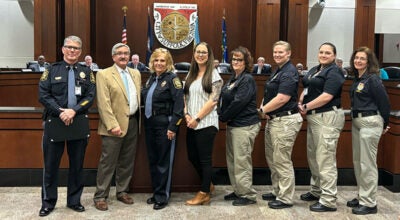Virginia Senate committee rejects hate crime expansion bill
Published 5:32 pm Tuesday, February 2, 2021
|
Getting your Trinity Audio player ready...
|
By Cierra Parks
Capital News Service
Legislators attempted to pass a bill that would expand the definition of a hate crime to include crimes against people based on perception, but opponents said the bill was too broad and could be misused.
The Senate Judiciary Committee passed the bill by for the year late last month. Four Democrats strayed from party lines to vote against the bill after much debate.
The current statute defines hate crime victims as those who are maliciously targeted based on race, religion, gender, disability, gender identity, sexual orientation or ethnicity. Legislators passed the legislation last year during the General Assembly session.
Senate Bill 1203, proposed by Sen. Ghazala Hashmi, D-Richmond, aimed to ensure that someone who maliciously attacks a person based on their perception of that person’s membership or association within one of the aforementioned groups is held to the same standard as someone who attacks a person they know is a member of one of the groups. Hashmi’s bill also added color, national origin and gender expression to the list of protected classes.
Hashmi cited an incident during Black Lives Matter protests last summer in which Harry H. Rogers, an avowed high-ranking member of the Ku Klux Klan, drove his truck into a crowd of protesters. Henrico’s Commonwealth’s Attorney Shannon Taylor said her client, who was hit, was not protected under current hate crime legislation because he is white. She said Rogers drove his truck with the intention to disrupt the protests.
“Our current law looks more at the victim and the victim’s characteristics than it does looking at the offender and his intent,” Taylor said.
Vee Lamneck, the executive director of Equality Virginia, said hate crimes are more than acts of violence. Such crimes are committed with the intention of inciting fear and dehumanizing groups, Lamneck said.
“Individuals with intersecting identities, especially Black, Latinx and Indigenous LGBTQ people are exposed to higher rates of violence,” Lamneck said. “Redefinition of the categories in this bill will help to further ensure that all diverse members of our communities are sufficiently protected by the law from hate crime violence and that perpetrators of such violence are held appropriately responsible.”
Sen. Chap Petersen, D-Fairfax, said during the committee hearing that the bill was a massive expansion of the current statute. Petersen said the proposed changes would be “pretty far off-field from the original purpose.”
Opponents, including the Virginia Association of Criminal Defense Lawyers, said the bill was too broad and could allow for the exploitation of who was a hate crime victim. Legislators pondered over if this meant a person of color could be charged with a hate crime for assaulting a white person and postulated several scenarios of how the bill could be misused.
Emanuel Harris, a representative for the Black Coalition for Change, called the questioning of the protection of white supremacists puzzling, offensive and laughable.
“The history has shown that the black community is the one being intimidated, not the other way around,” Harris said during the public comment portion of the meeting. Harris said the original statute needs to be expanded.
“I am offended that folks brought this and then clouded, or wrapped it up in BLM, and suggested that if we vote against it, somehow we’re not supporting the prosecution of hate crimes, cause that is not what we are doing,” said Sen. Joseph Morrissey, D-Richmond. “This bill is offensive in so many different ways.”
Morrissey was a co-patron for the hate crime legislation that passed in 2020.
Hashmi said Morrissey was approaching the bill from a position of privilege, at which point Senate Minority Leader Thomas Norment, R-Williamsburg, interrupted with an “Oh my God.” Hashmi continued and said the bill addressed race as well as oppressed and terrorized religious and LGBTQ communities.
The Anti-Defamation League helped with the bill’s language. Meredith R. Weisel, representing the ADL, said the bill is important because it would help ensure that offenders who are mistaken about the victim’s protected characteristics can still be held accountable for a hate crime under the law.
Brittany Whitley, chief of external affairs and policy with the Office of the Attorney General spoke in support of the bill along with other citizens and attorneys.
Hashmi said in an email that she hopes to refine the language in the bill and will consider reintroducing it next year.
“Addressing hate crimes is important for the well-being of our communities: hate crimes are designed to harm and inflict pain on not just the targeted individual(s) but also to intimidate and terrorize entire groups of people,” she said.





